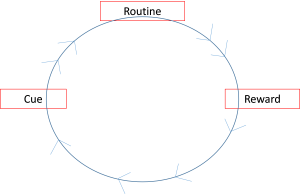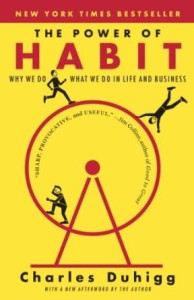The Power of Habit
From time to time, I will be taking a divergent path from the matters of coffee and writing about other topics I think you may want to know and/or things that are important. Once such diversion was a recent piece that was posted on Memorial Day. Today’s post will also be one of those divergent times…..although in this case, I could make an argument that its only mildly divergent, in that many people, including me, like to drink their favorite coffee, while doing this activity – namely reading.
So today, I thought I would write about a book that I just finished called the “Power of Habit” by Charles Duhigg.
I first learned of this book by listening to the Andy Stanley Leadership Podcast – one of my favorite’s – You can find his podcast on iTunes – http://bit.ly/ASLeadership – I highly recommend that you not only listen to these the podcast he did on this book, but in general, if you are interesting in improving your leadership, this is a good place in which to go. The two podcast he did on this book are: “Key Stone Habits” and “Keystone Habits – Interview with James Duhigg” – again great podcast!
This book intrigued me on a variety of levels. I think it has application, in our personal lives, our business lives and if you’re like me, in your entrepreneur life. I’m not going to try to distill the entire book in this short post, but hopefully you’ll get a flavor of what the book is about and want to read it for yourself.
Habits are interesting things, and to be honest, I really didn’t know how interesting they are until I read this book. It seems that our habits are controlled by a certain area of the brain called the basal ganglia. Habits allow are brain to not work as hard as when something is new – like starting a new morning routine. Once something becomes a habit, the basal ganglia work while the rest of the brain works less. (some folks would say the only things at work in my brain are the basal ganglia  ) A good example of this is when you’ve been driving your car to a place that you go to frequently, like a job, and when you arrive at your destination, and you don’t specifically remember what took place on the way there or how you exactly arrived there. The driving habit took over – while the rest of your brain to some extent, took a break or disengaged.
) A good example of this is when you’ve been driving your car to a place that you go to frequently, like a job, and when you arrive at your destination, and you don’t specifically remember what took place on the way there or how you exactly arrived there. The driving habit took over – while the rest of your brain to some extent, took a break or disengaged.
The process your brain uses to develop a habit is a three step process. Duhigg calls this the Habit Loop.  The First step in the process is the CUE – this is the trigger that causes your brain to go into automatic mode. The second step is the ROUTINE – this is the habit itself – which can be physical, mental or emotional. Finally there is the REWARD. This is event/incident/item, something you value, etc which helps your brain remember if the particular loop is something worth repeating. Interestingly, as we repeat the loop the more and more it becomes and engrained and becomes more automatic. As well stated by Duhigg, “the cue, and reward become intertwined until a powerful sense of anticipation and craving emerges”. As a result a habit is born. It’s interesting to me that both good and bad habits are formed this way, and by knowing the process you can form good habits, like taking up an exercise program, or breaking a bad habit, like biting your finger nails. This process and development of proper habits provided Coach Tony Dungee a method that would enable the Tampa Bay Buccaneers to come from being one of the worst teams in the NFL, to one of the best and eventually even winning the Super Bowl. A great example of ….practice not making perfect – but rather….perfect practice making perfect.
The First step in the process is the CUE – this is the trigger that causes your brain to go into automatic mode. The second step is the ROUTINE – this is the habit itself – which can be physical, mental or emotional. Finally there is the REWARD. This is event/incident/item, something you value, etc which helps your brain remember if the particular loop is something worth repeating. Interestingly, as we repeat the loop the more and more it becomes and engrained and becomes more automatic. As well stated by Duhigg, “the cue, and reward become intertwined until a powerful sense of anticipation and craving emerges”. As a result a habit is born. It’s interesting to me that both good and bad habits are formed this way, and by knowing the process you can form good habits, like taking up an exercise program, or breaking a bad habit, like biting your finger nails. This process and development of proper habits provided Coach Tony Dungee a method that would enable the Tampa Bay Buccaneers to come from being one of the worst teams in the NFL, to one of the best and eventually even winning the Super Bowl. A great example of ….practice not making perfect – but rather….perfect practice making perfect.
There are different types of habits as well. Some habits are more important than others. One such habit Duhigg discusses is one called a Keystone Habit. People can have Keystone Habits as well as organizations. A Keystone Habit is one that starts chain of reactions, changing other habits as they move through your mind or an organization. Michael Phelps utilized Keystone Habits to become the Olympian to win the most medals of any athlete in Olympic history.
Honestly, I don’t think I’ve done this book justice in the space I have for this post as there is much, much more I could write about it. The bottom line is that habits are very powerful. They can work for you or work against you. They can provide a path to great accomplishment or a path to destruction. In either case though habit loop begins with an intentional choice or decision. And I’ve heard it said before, a man’s life is the outcome of the many decisions, both large and small, we make on a continual basis.
All the best,
Island Mike
